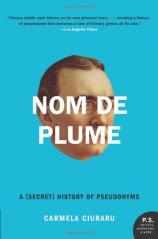Reading Group Guide
Discussion Questions
Nom de Plume: A (Secret) History of Pseudonyms

1. We are living in an era of made-up memoirs, semi-autobiographical fiction, social media such as Facebook and Twitter, and an ever-increasing number of “reality” TV shows. In a culture in which privacy is constantly being violated, threatened, and exposed, is it still possible to use a pseudonym without being discovered?
2. Think about some of the most common reasons why authors use pen names. What kind of protection do alter egos give them? Why is it that having a secret identity can prove so seductive?
3. Write your own name on a sheet of paper. What kind of history does it conjure for you? Do you feel ambivalence toward your name? Do you think your name reflects who you are?
4. The use of pseudonyms, in the traditional sense, has declined over the past several decades. Why do you think that’s true? What, if anything, does it say about our culture?
5. Do you think that inhabiting another identity to write—whether fiction or nonfiction—is fundamentally dishonest? Do different rules apply for different genres? Is there an instance in which it’s unacceptable for a writer to use a pen name?
6. As Isak Dinesen (Karen Blixen) once said, part of the allure of a nom de plume is to avoid answering personal questions, such as: Which part of your novel is drawn from real life? Which character is actually you in disguise? And so on. Do you think that readers have the right to the details of an author’s life, even if the author writes fiction? Are authors obliged to “sell” themselves rather than letting work speak for itself?
7. How would you distinguish between the contemporary use of fake names online—pretending to be someone you’re not—and the use of a pen name to publish a book? Is there a difference?
8. The author V. S. Naipual has stated that he always knows when he is reading a novel by a female author. Do any of the works by the pseudonymous female authors in this book (such as Alice Sheldon, who published science fiction as James Tiptree, Jr.) overturn that assumption? If so, how?
9. To what extent were the authors in this book exploring different personalities through their names? In the case of Samuel Clemens, how did Mark Twain provide a buffer against the darker side of his personal life?
10. Consider some of the nineteenth-century women writers featured in this book, such as the Brontës, George Sand, and George Eliot. How do you think their novels would have been received if they had not used pen names? What power did they gain by pretending to be men?
11. As a reader, is it important for you to know about the personal lives of your favorite authors? Why? How does having less (or more) information about an author affect your reading experience, if at all?
12. Have you ever wanted to use a pseudonym? If so, why? Would a secret identity allow you to write something that you would not otherwise attempt?
Nom de Plume: A (Secret) History of Pseudonyms
- Publication Date: May 29, 2012
- Genres: Biography, History, Nonfiction
- Paperback: 400 pages
- Publisher: Harper Perennial
- ISBN-10: 0061735272
- ISBN-13: 9780061735271







